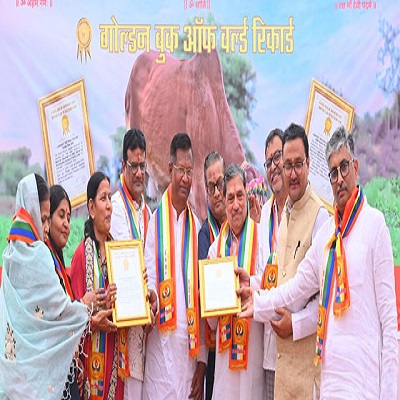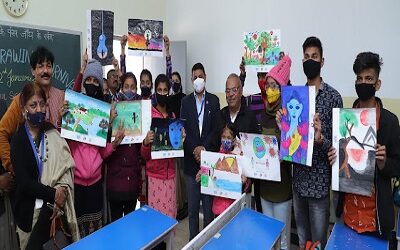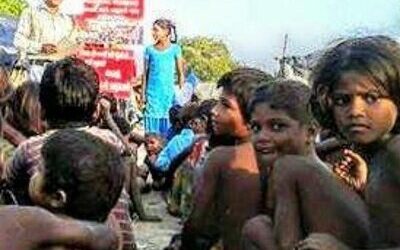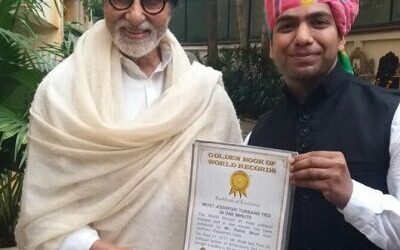Hindu civilization is an important part of the basic religious and cultural identity of Indian society, and the cow has great importance within it. The cow, or “Mata Cow,” is a sacred animal revered in Hinduism, and has deep religious and cultural associations. In Indian culture, the cow is a symbol of purity, motherhood and nourishment, and its protection is a deeply rooted value. Beyond their cultural and religious importance, cows play an important role in India’s economy, especially in rural areas. They provide milk, the primary source of nutrition for many Indians, and their dung is used as fuel and fertilizer. Furthermore, cow-based products such as ghee, butter and curd are integral parts of Indian cuisine. The economic value of cows extends to agriculture, where they are used to plough fields and transport goods. Given their multifaceted importance, cows in India are not just animals; They are essential to the country’s cultural heritage, economy and daily life.
“Respect the cow, the cow is like a mother” is the slogan of Manohar Gaushala located at Dharampura, Khairagarh, Chhattisgarh, which has become famous for its continuous kindness and service-oriented work. Old and disabled cows are served here. Gaushala started with just 18,000 square feet of land. Presently it is spread over 11 acres of land and 10 acres of rented land. The organization aims to build a self-sustaining cow shelter spread over 100 acres and 25 acres of dense forest where thousands of cows can live. The crop elixir produced at Manohar Gaushala helps farmers grow profitable produce and prevents potential damage to crops due to inadequate water or nutrients. This organic water-retaining hydrogel is bringing unprecedented changes in agriculture and is becoming a favourite among Indian farmers. The crop nectar produced in Manohar Gaushala by the scientists of Indira Gandhi Agricultural University and Research Center has been said to be very useful for environmental protection and human health and further research work on it is going on. Director of the University’s Research Center, Dr. Vivek Tripathi, along with Dr. LK Srivastava and four other scientists have extended the research period for this work and have said that Fasal Amrit will prove to be a unique gift for the farmers of the country.
Manohar Gaushala has been honoured by being nominated in two categories in the Golden Book of World Records. Manohar Gaushala and Smt. Kamla Bai Kanhaiyalal Dakalia Charity Trust has been awarded the world record with the title of “Largest Distribution of Gomutra Ark” for distributing the maximum amount of cow urine extract globally and also got a world record in the Golden Book of World Records with the title of “Largest Distribution of Earthen Lamp Made With Cow Dung” for the maximum free distribution of lamps made from cow dung. Managing Trustee of Manohar Gaushala, Akhil Jain (Padam Dakalia) said that till now 12 thousand bottles of cow urine extract and more than 3 lakh 50 thousand lamps made from cow dung have been distributed free of cost.
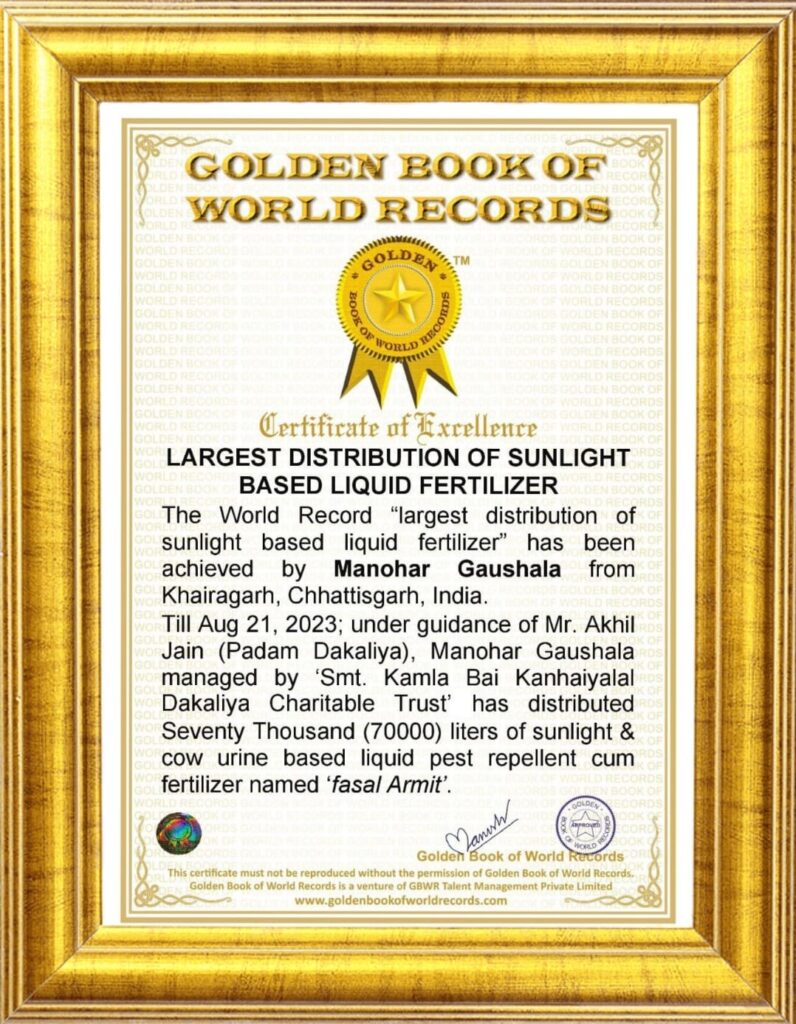
Both the honours received by the Golden Book of World Records were given to Manohar Gaushala’s Managing Trustee Akhil Jain (Padam Dakalia) Raipur, Trustees Pukhraj Kothari Chennai, Mahendra Lodha and Praveen Parakh Raipur, Tejraj Golchha Bangalore, Manish Bothra Durg, social workers Rajendra Dakalia, Narendra Bothra, Chaman Daklia, bhajan singer Naman-Jainam Daklia, among hundreds of cow servants, received the said honour in the Gaushala by Mrs Sonal Rajesh Sharma, representative of the Golden Book of World Records (Team GBWR). Earlier, Gaushala Trustee Padam Dakalia dedicated both awards to former Chhattisgarh Governor Ms Anusuiya Uike at Raj Bhavan. Let us tell you that Ms Anusuiya Uike Ji has been associated with the work of Manohar Gaushala and has been continuously getting her support for the darshan of Mata Kamdhenu and for promoting various works of the Gaushala.
Kamdhenu cow, present in the Manohar Gaushala dedicated to cow service located at Dharampura in Khairagarh, Chhattisgarh, has been awarded the Golden Book of World Records. The Trust has named the mother cow Soumya Kamdhenu Cow Mata. This honour has been given for being the cow with the longest tail in the world. Earlier this honor was given to a cow in Brazil. Whose tail length was 48 inches. The length of the tail of the Soumya Kamdhenu cow is 54 inches. That is why Soumya Kamdhenu’s name was registered as a world record with the title of “Longest Tail of Cow” by the organization Golden Book of World Records. Only four to five such cows exist in the world. Shri Kamalabai Kanhaiya Lal Charitable Trust brought Kamdhenu’s cow from Jaisalmer and kept it in Manohar Gaushala, since then the continuous service of cow mother Soumya Kamdhenu has continued here. Earlier, the Gaushala had also been honoured for cleanliness.

